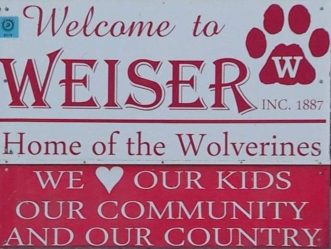During the conference I was assigned to take charge of the Weiser district, so we began a long journey. First, we drove 125 miles back to the Grand Ronde Valley and then continued another 150 miles to Weiser in our spring wagon. The journey was grueling, with dust so deep it reached from our ankles to our knees.
As we neared Weiser, we stopped at a ranch house to ask for directions. The owner, upon learning I was assigned as the preacher to what was known as “Robber’s Roost,” bluntly asked, “What in hell did you ever come here for? They’ll kill you or starve you out within the next two months.”
While we were talking, my horses became spooked, causing the wagon to tip over, damaging our furniture and breaking most of our jars of fruit. Fortunately, a nearby man helped me catch the runaway team and repair the wagon. When I asked if there were any Methodists in the area, he replied, “The Lord only knows; I don’t. I am a Baptist, but a mighty poor excuse for one.”
We found no vacant houses in Weiser, but the Baptist man offered a temporary solution. A bachelor friend of his had gone hunting for a month and had left behind a small 12×14 shack near Weiser. We moved our belongings into the woodshed and settled into the shack until the owner returned. When he did, we arranged to give him his board in exchange for continuing to stay in his home.
My first year in Weiser was financially challenging. I spent $700 of my savings, while my total income from salary, marriage fees, and other sources was only $170. Each weekend, I would travel 40 miles to Immettsville (now Emmett), preach there on Sunday morning, give an afternoon sermon at a schoolhouse, and then head to Payette to preach in the evening. The following day, I would return to Weiser with a load of lumber to build my house.
It was a difficult beginning, but one filled with determination and faith.
I took up a claim on Buttermilk slough. The snow that winter lay on the ground two to three feet deep. The only wood we had to burn was small willows and it seemed as if I had to keep chopping wood all the time to keep the fire going. When I had hauled my lumber, my Baptist friend, Mr. Sumner, helped me build my house.
“The first service I held at Weiser was a funeral service for a cowboy who had been shot by a saloonkeeper because the cowboy refused to take a drink with him. The text I preached from was, “There is a way that seem-eth right unto a man, but the end thereof are the ways of death.” The first regular service I held was in an unfurnished building. The saloon men and gamblers knocked off their work for a couple of hours to hear me, I thought if I was going to be killed or run out I might as well know the worst as soon as possible, so I preached as strong a sermon as I could against liquor, lust and gambling. The first money I earned was $10, which was paid me by the man who had told me that I would be killed or run out in two months. He borrowed my spring wagon and team to take the saloonkeeper who had killed the cowboy to Boise.
Our youngest daughter was born there on May 22 in an unfurnished house. Thére were no doors or windows in the house, so there was no lack of fresh air. “My church congregation was a very mixed lot. I had Free Will Baptists, Hard Shell Baptists, Missionary Baptists, a few Methodists, and some others who couldn’t remember what church their people belonged to.”
Though they called Weiser, ‘Robber’s Roost’ when I went there, yet four years later the Methodist conference was held at Weiser.”
From Oregon Daily Journal – Portland Oregon, Wednesday, October 12, 1921






